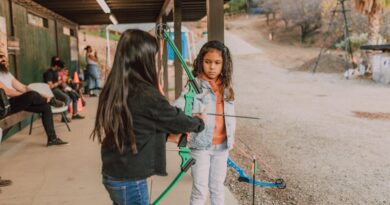Responsible Bowhunting for Ethical Hunters: A Comprehensive Guide
Welcome to the world of bowhunting, where skilled marksmanship, respect for nature, and ethical hunting practices converge. As an ethical hunter, the pursuit of game is more than just a sport; it’s a way of life that demands responsibility, stewardship, and a deep connection to the natural world. In this comprehensive guide, we will delve into the principles of responsible bowhunting, exploring the ethical considerations, conservation efforts, and best practices that define this time-honored tradition.
The History of Bowhunting

Before we dive into the intricacies of responsible bowhunting, let’s take a step back in time to explore the rich history of this ancient practice. Bowhunting dates back thousands of years, with early humans using bows and arrows for survival and sustenance. Over time, bowhunting evolved from a means of procuring food to a revered skill that required precision, patience, and respect for the animals being hunted.
Fast forward to the present day, and bowhunting has become a popular recreational activity enjoyed by millions of hunters worldwide. However, with this popularity comes a responsibility to uphold ethical standards and conservation principles to ensure the long-term sustainability of wildlife populations.
The Ethics of Bowhunting

At the heart of responsible bowhunting lies a set of ethical guidelines that govern the behavior and actions of hunters. Ethical hunters abide by the principles of fair chase, which dictate that hunting should be conducted in a manner that gives the animal a reasonable chance to escape. This means refraining from using unethical practices such as baiting, spotlighting, or shooting from vehicles.
Additionally, ethical hunters prioritize clean kills, aiming for vital organs to ensure a quick and humane death for the animal. Proper shot placement, practice with archery equipment, and knowledge of animal anatomy are crucial components of ethical bowhunting.
Conservation and Stewardship

Responsible bowhunting goes hand in hand with conservation efforts to protect wildlife populations and their habitats. Hunters play a vital role in wildlife management by helping to control populations, prevent disease outbreaks, and preserve ecosystems. Through the purchase of hunting licenses and tags, hunters contribute to conservation funding that supports research, habitat restoration, and enforcement of hunting regulations.
Stewardship of the land is another key aspect of responsible bowhunting. Hunters are encouraged to respect the environment, minimize their impact on natural resources, and practice leave-no-trace principles while in the field. By acting as responsible stewards of the land, bowhunters can help ensure that future generations will have the opportunity to enjoy the thrill of the hunt.
Best Practices for Responsible Bowhunting

Now that we’ve established the ethical and conservation principles of bowhunting, let’s delve into some best practices that every ethical hunter should adhere to:
1. Safety First
Prioritize safety above all else when bowhunting. Always practice with your bow to maintain proficiency, wear appropriate safety gear, and follow all firearm safety protocols while in the field.
2. Know Your Limits
Understand your capabilities as a hunter and only take shots that you are confident will result in a clean kill. Respect the animal by ensuring a quick and humane harvest.
3. Respect Wildlife
Approach hunting with a sense of reverence for the animals you pursue. Treat wildlife with respect, follow all hunting regulations, and avoid excessive pressure on sensitive populations.
4. Support Conservation Efforts
Contribute to conservation initiatives by purchasing hunting licenses, supporting wildlife organizations, and volunteering for habitat restoration projects. Be an advocate for sustainable hunting practices.
Common Misconceptions about Bowhunting
Despite the emphasis on ethics and conservation in the bowhunting community, there are several common misconceptions about the sport that deserve clarification:
1. Bowhunting is Inhumane
Contrary to popular belief, bowhunting can be a humane and ethical way to harvest game when practiced responsibly. Skilled hunters can achieve quick, clean kills that minimize suffering for the animal.
2. Bowhunters Don’t Care About Conservation
On the contrary, bowhunters are often at the forefront of conservation efforts, contributing significant funding and volunteer hours to protect wildlife habitats and populations. Many hunters are passionate advocates for conservation and sustainability.
FAQs about Responsible Bowhunting
Q: Are there specific regulations that govern bowhunting?
A: Yes, each state has its own set of regulations and requirements for bowhunting, including licensing, season dates, and bag limits. It’s essential for hunters to familiarize themselves with these regulations before heading into the field.
Q: What should I do if I wound an animal while bowhunting?
A: If you suspect that you have wounded an animal but are unable to recover it, it’s essential to report the incident to the appropriate wildlife agency. This allows for proper follow-up and ensures that the animal is not left to suffer.
Conclusion
To wrap things up, responsible bowhunting is not just a pastime; it’s a way of life that demands respect, ethics, and a deep connection to the natural world. By upholding ethical guidelines, supporting conservation efforts, and practicing stewardship of the land, hunters can ensure that the tradition of bowhunting continues for generations to come.
Whether you’re a seasoned bowhunter or new to the sport, remember that ethical hunting practices are the foundation of responsible bowhunting. Embrace the challenge, savor the experience, and always strive to be a steward of the land.




